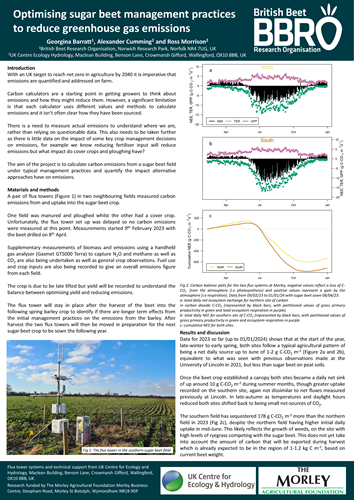Main Objectives
This project will be an industry leading carbon measurement project. A pair of flux towers (Figure 1) in two neighbouring fields will measure carbon emissions from the soil and crop as well as uptake by the sugar beet. Each field will have different management practices, such as cover crop vs. stubble and ploughing vs. reduced tillage. Crop and soil carbon will also be assessed to understand carbon sequestration. Yield will be recorded to understand the balance between optimising yield and reducing emissions. The aim of the project is to calculate carbon emissions from a sugar beet field under typical management practices and quantify the impact alternative approaches have on emissions.
The NFU and British Sugar are developing a Beet Climate Partnership to produce carbon neutral sugar as they have been approached by Nestlé who are willing to pay a premium for this. The Beet Climate Partnership will ensure that this added value is passed on to growers who have adopted practices which reduce emissions, including those in the East of England. Initially this work will involve the use of carbon calculators, to give a ballpark idea of where emissions are generated, as there is an urgency to move forward with the partnership. However, they will not comprehensively quantity the impact of management practices on emissions. To underpin the beet climate partnership and truly achieve net zero it is crucial that the emissions from sugar beet on farm are further understood and the impact of management decisions quantified. Alongside feeding data into the Beet Climate Partnership ongoing updates from the project will be disseminated at BBRO events and Beet Review magazine to reach growers and other professionals in the industry. BBRO will also attend relevant conferences to promote the project to the scientific community. In addition to supporting the sugar beet industry the project will also be used as a demonstration of the approach of using flux towers to study emissions in UK arable systems. It is proposed that this can be used to engage with other agricultural research organisations to develop a network of these paired fields in which a range of crops can be assessed and the whole rotation monitored. This is important because management practices in a previous crop can affect the performance of subsequent crops, and this could alter their carbon emissions. 4 Overall, the project will produce data which can be used to guide growers on the best practice to reduce emissions. This will be supported by the Beet Climate Partnership which will work towards adding value to sugar beet grown in a way that lower emissions through the work of the NFU and British Sugar. Lastly the project can be used to develop collaborations to expand the approach to assess the wider arable rotation to help support the whole arable sector in it move toward net zero.
Outcomes / Key Message For Growers And Industry




